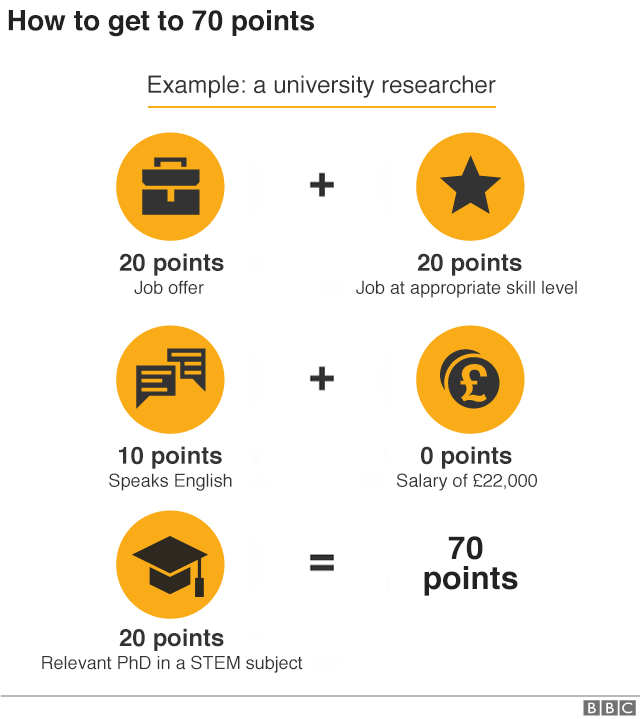Low-skilled workers would not get visas under post-Brexit immigration plans unveiled by the government.
It is urging employers to “move away” from relying on “cheap labour” from Europe and invest in retaining staff and developing automation technology.
The Home Office said EU and non-EU citizens coming to the UK would be treated equally after UK-EU free movement ends on 31 December.
Labour said a “hostile environment” would make it hard to attract workers.
But Home Secretary Priti Patel told BBC Breakfast the government wanted to “encourage people with the right talent” and “reduce the levels of people coming to the UK with low skills”
Who is ‘skilled’?
Under the plan, the definition of skilled workers would be expanded to include those educated to A-level/Scottish Highers-equivalent standard, not just graduate level, as is currently the case.
Waiting tables and certain types of agricultural worker would be removed from the new skilled category, but new additions would include carpentry, plastering and childminding.
How would it work?
The government wants to bring in a “points-based” immigration system, as promised in the Conservative election manifesto.
Under this, overseas citizens would have to reach 70 points to be able to work in the UK.
Speaking English and having the offer of a skilled job with an “approved sponsor” would give them 50 points.
More points would be awarded for qualifications, the salary on offer and working in a sector with shortages.


Workers from European Economic Area countries currently have the automatic right to live and work in the UK irrespective of their salary or skill level.
The government says this will end on 31 December, when the 11-month post-Brexit transition period is due to finish.
Pay levels
The salary threshold for skilled workers wanting to come to the UK would be lowered from £30,000 to £25,600.
However, the government says the threshold would be as low as £20,480 for people in “specific shortage occupations” – which currently include nursing, civil engineering, psychology and classical ballet dancing – or those with PhDs relevant to a specific job.
But there would no longer be an overall cap on the number of skilled workers who could come into the UK.
What about lower-paid sectors?
The government said it would not introduce a route for lower-skilled/lower-paid workers, urging businesses to “adapt and adjust” to the end of free movement between EU countries and the UK.
Instead, it said the 3.2 million EU citizens who have applied to stay in the UK could help meet labour demands.
But bodies representing farming, catering and nursing are warning that it will be hard to recruit staff under the new system.
The Royal College of Nursing said the proposals would “not meet the health and care needs of the population”.
National Farmers’ Union president Minette Batters raised “serious concerns” about the “failure to recognise British food and farming’s needs”.
And the Food and Drink Federation spoke of concerns about bakers, meat processors and workers making food like cheese and pasta not qualifying under the new system.
However, the government pointed to a quadrupling of the scheme for seasonal workers in agriculture to 10,000, as well as “youth mobility arrangements”, allowing 20,000 young people to come to the UK each year.



